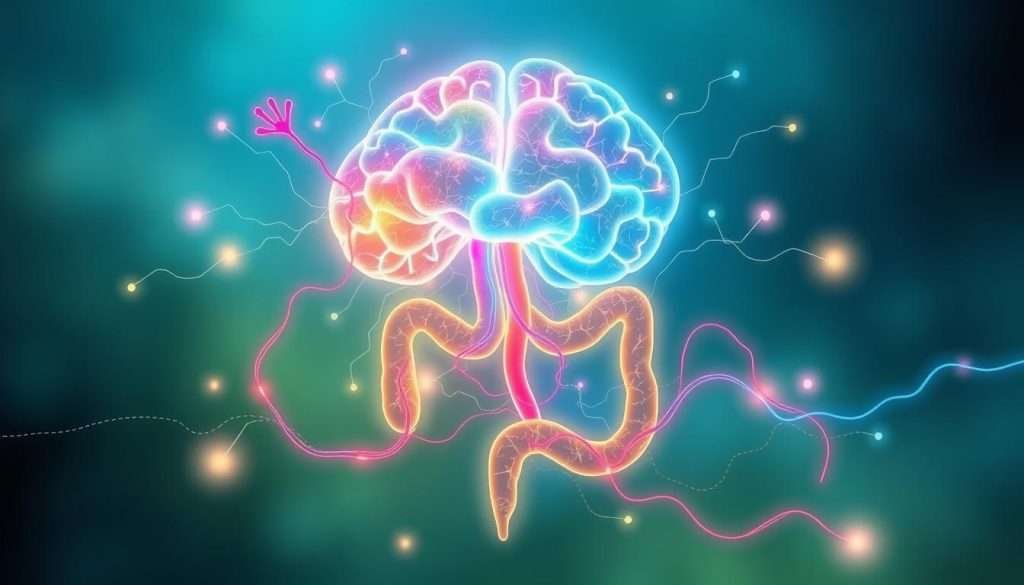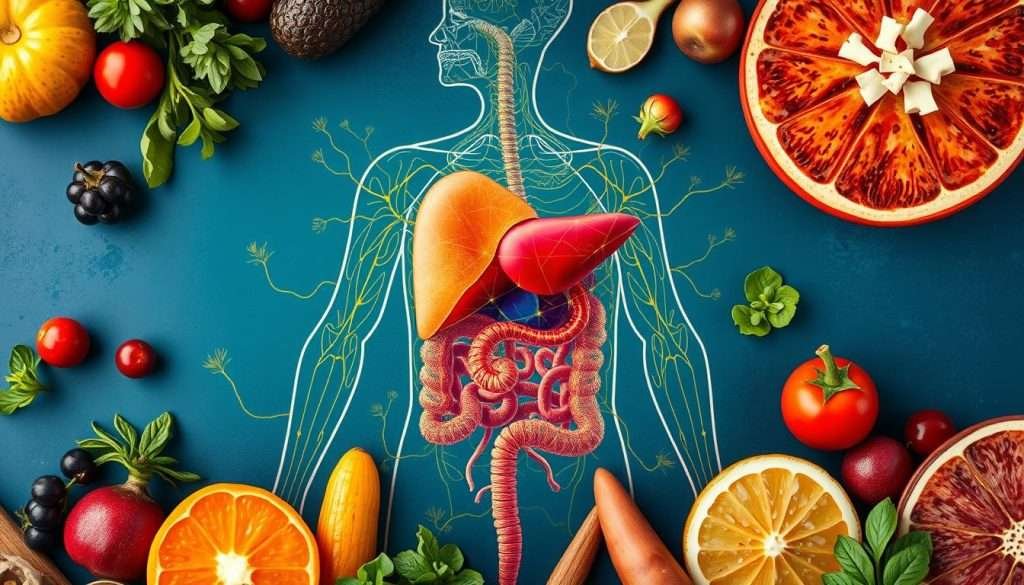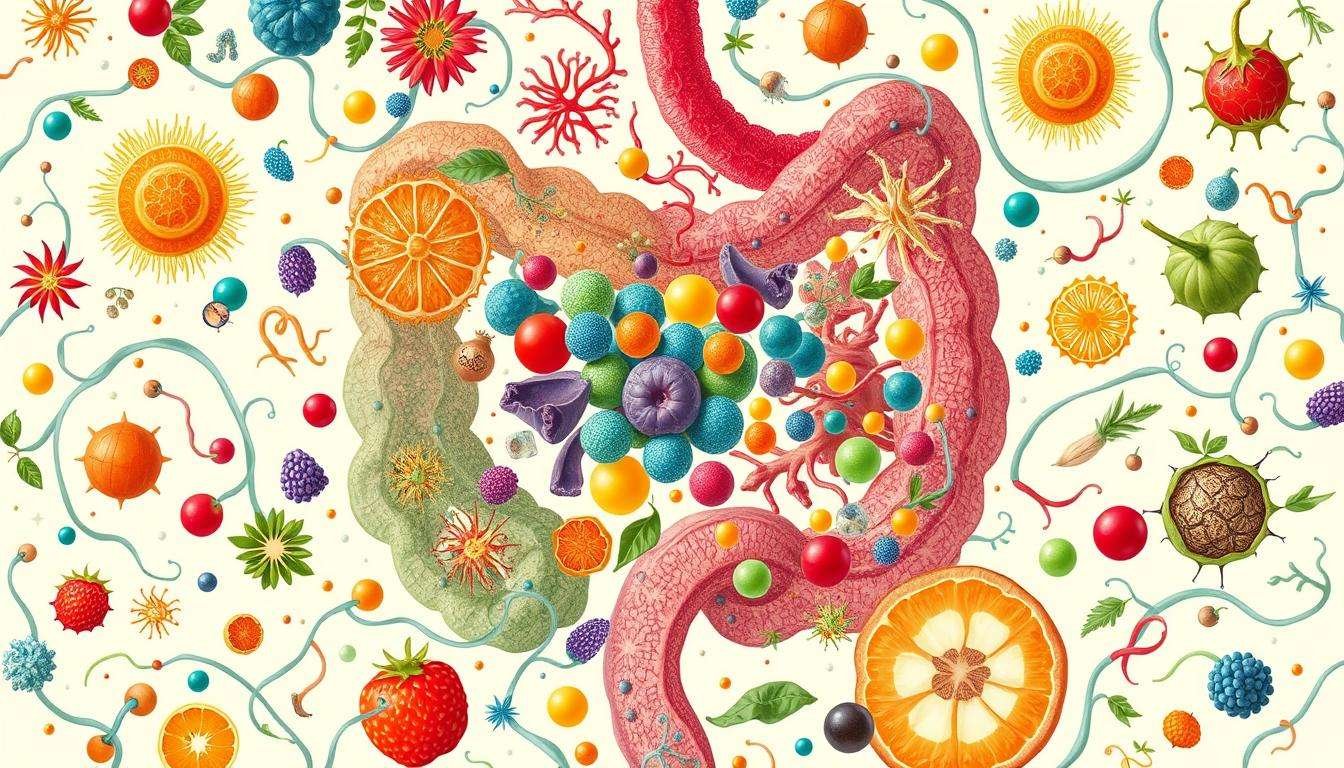Research into gastrointestinal microbiota is growing fast. It shows how important our gut health is to our overall well-being. Studies of clinical trials since 2003 reveal a huge interest in how our gut bacteria affect us. This research focuses on fighting obesity, using fecal transplants, and diets’ effects on our gut.
With advancements in this area, it’s clear that knowing how nutrition affects our gut is vital. Knowing this can help improve our health.
A diverse and stable gut microbiome is key to good health. Eating foods high in dietary fiber helps good bacteria thrive. These bacteria make short-chain fatty acids (SCFAs) that fight inflammation and boost gut health.
Diet affects the variety of our gut bacteria. Things like carbs, proteins, fats, and certain chemicals play roles. Probiotics and prebiotics are important too. They help increase the good bacteria in our guts.
Changes in gut bacteria can lead to issues like IBS, Crohn’s disease, and reflux. A healthy gut means a stronger immune system, better digestion, and less risk of these problems. A diet high in fiber, staying hydrated, managing stress, sleeping well, exercising, and sometimes supplements can help keep our gut microbiome healthy.
Key Takeaways
- A diverse gut microbiota is essential for promoting a healthy gut microbiome.
- Dietary fiber supports beneficial bacteria and fosters a healthy microbiome.
- Short-chain fatty acids, produced by gut bacteria, have anti-inflammatory properties.
- Changes in gut microbiota are linked with various gastrointestinal disorders.
- Maintaining a balanced diet and lifestyle significantly supports gut health.
The Role of Gut Microbiota in Health
The human gut hosts about 100 trillion microorganisms. These include bacteria, viruses, fungi, and protozoa. They make up the gut microbiota, crucial for our gut health.
The microbiome links closely with digestion, metabolism, and immune response. Its function affects many parts of human health.
Importance of Gut Microbiota
The gut microbiota has over three million microbial genes. That’s much more than the 23,000 protein-coding genes in humans. These microbes are key to gut health.
They ferment dietary fibers to make short-chain fatty acids (SCFAs) like butyrate. SCFAs are important for energy balance, appetite, and glucose metabolism. Less diverse gut microbiota can lead to obesity and diseases.
Interaction with the Host
How gut microbes interact with their host is vital. They produce metabolites that affect the cells of the host. For example, butyrate fuels colon cells, reducing inflammation.
Propionate helps with glucose creation and feeling full. Acetate is involved in managing cholesterol. These interactions are also vital for a healthy immune system.
Impact on Digestion and Metabolism
Gut microbes play a big part in digestion and metabolism. They break down carbs into useful energy. This process is crucial for gut movement and nutrient absorption.
Eating more fiber changes gut microbiota for the better. It improves metabolism and lowers the risk of diseases. Microbial genes influence the body’s metabolic pathways.
Knowing how gut microbiota interacts with its host helps in creating better diets and treatments. This can lead to a healthier gut environment.
Understanding the Concept of Dysbiosis
Dysbiosis is tied to gut health. It’s about an imbalance in the gut microbiome, affecting us in many ways. Knowing what it is, why it happens, and what it does is key to dealing with it.
Definition and Causes
Dysbiosis means the gut’s natural microbes are off balance. It can come from bad eating habits, too many antibiotics, or lots of stress. Our gut has up to 1,000 kinds of microorganisms that do important jobs. But with dysbiosis, good bacteria like Bifidobacteria and Lactobacilli drop, which leads to health problems. A limited diet can make this worse, causing more inflammation and weakness, mainly in older adults.
Indicators of Dysbiosis
To find dysbiosis, look for signs like being tired a lot, mood swings, or stomach troubles. Doctors can also tell by testing stool samples with methods like the GI-MAP and the GI FX Comprehensive Stool Profile. These tests show changes in gut flora, helping to pick the right treatment. A key measure is the Shannon Index, which checks if there’s enough variety in gut microbes.
Consequences on Overall Health
Issues with the microbiome can seriously affect our health. It can lead to digestion problems and big diseases. For example, autoimmune diseases like IBD and rheumatoid arthritis, or even obesity, diabetes, and Alzheimer’s disease. Dysbiosis can mess with how our bodies handle fat and affect our mood and immune system. Eating well, like sticking to the Mediterranean diet, can help keep the gut balanced. It improves insulin levels and keeps us healthy overall.
Dietary Interventions for Gut Health
Our gut health greatly benefits from the foods we eat. Studies show that certain foods help maintain a healthy gut. These include probiotic supplementation, prebiotic advantages, and the role of dietary fiber benefits.
The Power of Probiotics
Probiotics are beneficial live bacteria. They improve our gut flora’s diversity and activity when eaten in the right amounts. Probiotics, found in yogurt and fermented foods, boost good bacteria like Bifidobacteria and Lactobacillus. This supports our immune system and lowers inflammation.
Prebiotics and Their Benefits
Prebiotics are different from probiotics. They are foods that our body can’t digest, but they feed healthy gut bacteria. Including garlic, onions, and bananas in your diet supports a healthy gut.
These prebiotics travel through our stomach undigested. They then become food for the good bacteria in our colon.
Impact of Dietary Fiber
Dietary fiber benefits our gut in many ways. A high-fiber diet like the Mediterranean diet encourages helpful bacteria to thrive. Research with 153 participants showed a diet rich in vegetables increases beneficial short-chain fatty acids and Firmicutes.
These are associated with better digestion and a lower risk of heart diseases. More dietary fiber also means more regular and healthier bowel movements, according to studies.
The Connection Between Gut Health and Nutrition
Understanding the link between gut health and nutrition is key to our well-being. The way our digestion interacts with food is complex. An average adult male’s gut carries about 3.8 × 1013 microbes, more than our own cells. This variety of microbes is vital for our digestive health.
Our guts have at least 160 species of microbes, from a total of 1150. Most of these are Firmicutes and Bacteroidetes. Having a balance between these is crucial for staying healthy. Changes in our gut microbes are linked to obesity and diabetes. The microbes’ genes in our digestion outnumber human genes, impacting how we digest food and use energy.
The human gut has about 100 trillion microbes. That’s nearly ten times more than our body cells. This shows why a balanced diet is important.
What we eat changes our gut microbes. Eating dietary fibers reduces colorectal cancer risk. This benefit comes from short-chain fatty acids which are good for our tissues. Plus, our gut microbes make essential vitamins like K, B12, and Thiamine. This shows the connection between good digestion and getting enough vitamins.
Microbes in the gut can adjust their metabolism quickly. This ability surpasses ours and helps in nutrient absorption. For instance, undigested proteins help beneficial bacteria grow. These bacteria produce helpful acids for our gut health.
The inner mucus layer in our large intestine protects us and supports good bacteria. It’s vital for health and gets renewed. Keeping this balance is necessary for preventing health issues. It highlights why understanding gut health and nutrition is important.
From the time we’re born, our gut health starts to develop. Things like natural birth and breastfeeding shape our gut microbes. Breastfeeding encourages good bacteria growth, helping long-term health and immune strength.
To conclude, a balanced diet supporting diverse microbes is vital for our health. Knowing more about gut health can improve our health and life quality.
Impact of Gut Health on Immune Function
The gut plays a key role in our immune health. About seventy percent of our immune system is in the gut. This connection, called the *gut-immune axis*, is vital for keeping us healthy. Factors like diet, stress, and antibiotics affect our gut bacteria. These factors shape how our immune system reacts.
The Gut-Immune Axis
The *gut-immune axis* is about how our gut bacteria and immune system interact. The makeup of our gut bacteria is crucial for our immune system to work well. This interaction helps our body protect itself. Germ exposure in early life is important for our immune development, setting up a network that helps us throughout life.
Role in Autoimmune Diseases
Our gut health also plays a role in autoimmune diseases. The condition of our gut can make these diseases better or worse. Eating lots of fiber and healthy fats makes for less inflammation. But a Western diet can do the opposite, making autoimmune diseases more likely.
Influence on Allergies and Asthma
Gut health and allergies are closely linked. A healthy gut helps fight infections and keeps immune reactions to allergens in check. This can prevent allergies and asthma. Eating fish, plant-based proteins, and spices helps with this. But antibiotics can disturb gut bacteria, making allergic reactions and respiratory issues more common.
Gut-Brain Axis and Mental Health
The gut-brain connection is really interesting and important. It uses nerves, hormones, and immune signals. These signals help keep our mind healthy. A healthy gut means a healthy brain.

Bidirectional Communication
The brain and gut talk to each other in two ways. The brain has about 100 billion neurons, and the gut has 500 million. This chat affects our thoughts and stomach.
People with IBS or Crohn’s often have weaker vagus nerves. This can affect how they feel every day.
“This vagal tone reduction exemplifies how gut issues can significantly influence brain function, potentially leading to mood disorders.”
Impact on Anxiety and Depression
The gut influences our feelings of anxiety and depression. Some probiotics can make mice feel less anxious. They do this by creating a special brain chemical.
Foods rich in omega-3 fats, like fish, feed good gut bacteria. This can help keep our brain healthy.
“Consuming fermented foods like yogurt and kefir introduces beneficial microbes that can positively alter brain activity, thereby promoting mental well-being.”
Role in Neurological Conditions
The gut also impacts other brain conditions. Certain gut bacteria products can make us eat less and think better. Foods rich in polyphenols, like dark chocolate and green tea, help too.
Foods with tryptophan, like turkey, are good for the brain. They help make serotonin, which keeps our mood steady.
“A well-balanced diet rich in prebiotics, probiotics, and essential fatty acids is integral to maintaining a healthy gut and, by extension, a healthy brain.”
Gut-Skin Axis: Influence on Dermatological Health
The connection between our gut health and skin is truly interesting. The skin is our body’s largest organ. It reflects our inside health. This connection is known as the gut-skin axis. It shows how gut health affects skin conditions like acne and psoriasis. When our gut is out of balance, it can show up as skin problems. This proves how crucial a healthy gut is for our skin.
Our skin is home to more than 1,000 types of bacteria. Malassezia is the main fungus on our skin. Similarly, our gut contains a rich world of microbes. Studies have found that these gut microbes affect our skin. They do this through their actions and effects on our immune system. This shows a strong link between our gut and skin health.
Long ago, in 1912, people used Lactobacillus bulgaricus to treat skin problems. Today, we have more skin products with good microbes, called probiotics. Products with probiotics help improve skin health. They need to have at least 1,000 CFU to work well. Probiotics keep the skin safe from harmful germs, help digestion, and boost the immune system.
The bacteria on our skin changes depending on the area. Some probiotics help both our gut and skin health. As more people want a balanced skin microbiome, products with probiotics are becoming more popular. This supports the idea that a healthy gut leads to good skin.
How Antibiotics Affect Gut Health
Antibiotics save lives by fighting serious infections. But, they also impact our gut’s good bacteria, leading to antibiotics dysbiosis. It’s key to understand this and know how to recover.
Disruption of Microbiota
Antibiotics kill harmful bacteria but also harm our gut’s ecosystem. They reduce the number and types of good bacteria. Recovery can take months and depends on the antibiotic type, how often it’s used, and our diets.
For older adults, babies, and little kids, getting their gut bacteria back to normal can be slow.
Long-term Consequences
Using antibiotics too much can change our gut health for a long time. For babies, it can mess up how their gut bacteria grow. This can lead to more sickness and immune issues later. Around 35% of women in Western countries take antibiotics when pregnant. This shows why it’s important to use antibiotics wisely.
Strategies for Recovery
To fix our gut after antibiotics, diet is key. Eating prebiotic foods like vegetables, fruits, and nuts helps. So does eating fermented foods like yogurt and kombucha.
- Eating lots of prebiotic and fermented foods is good.
- Exercise like yoga, running, or weight training helps too.
- Being outside, gardening, or playing with pets can also improve gut health.
Taking probiotics seems like a quick solve but might not help right away. A blend of the right foods, exercise, and being in nature is the best recovery path.
The Gut-Liver Axis and Metabolic Health
The gut-liver interplay is crucial for metabolic health. Non-alcoholic fatty liver disease (NAFLD) plays a big role in this. It’s a leading cause of chronic liver disease in Western countries.

NAFLD includes conditions like non-alcoholic fatty liver (NAFL) and non-alcoholic steatohepatitis (NASH). NAFL is generally less serious than NASH. NASH can lead to severe liver problems, such as cirrhosis and liver cancer.
There’s a suggestion to rename NAFLD and NASH to reflect their link to metabolic issues. They might be called metabolic dysfunction-associated steatotic liver disease (MASLD) and metabolic dysfunction-associated steatohepatitis (MASH).
Many factors contribute to NAFLD becoming severe, like NASH. These include diet, insulin resistance, and hormones from fat tissue. Also, oxidative stress, changes in genes, and toxins from gut bacteria play a part.
For example, eating too much fat and carbs but not enough fiber can upset the gut balance. This is closely linked to the worsening of NAFLD.
Intestinal permeability also plays a big role in liver inflammation, a key feature of NASH. The gut’s microbes and their products significantly affect how the liver responds to disease. But, we need to learn more about their exact roles.
- Polyphenols, n-3 fatty acids, and polysaccharides in the diet can help fight NAFLD.
- The mix of flavan-3-ols and n-3 fatty acids shows promise in preventing NAFLD.
About one in three people with inflammatory bowel disease (IBD) also have NAFLD. Those with IBD are more likely to have severe liver fibrosis than others. We need more studies to understand if IBD makes NAFLD worse on its own.
| Bacterial Genera | Associated Condition | Observation |
|---|---|---|
| Escherichia coli & Bacteroides vulgatus | NAFLD | Higher abundance in early and advanced fibrosis stages |
| Prevotella & Bacteroides genera | NASH (Stage 2 fibrosis or higher) | Lower levels observed in patient stool samples |
| Enterobacteriaceae family | Alcoholic Liver Disease (ALD) | Increased numbers in patient gut microbiome |
| Streptococcus & Veillonella | Liver Cirrhosis | Observed invasion into small intestine |
Synbiotics, probiotics, and prebiotics may improve liver diseases. But we need more, long-term studies with many people to be sure. This shows how important the gut-liver interplay is for metabolic health. It highlights the need for more research.
Identifying and Diagnosing Gut Imbalances
Understanding gut imbalances is key to good gut health. Stool sample analysis gives us insights into our gut bacteria. Tests like the GI-MAP and GI FX Comprehensive Stool Profile help find issues and plan treatments.
The GI-MAP Test
The GI-MAP test uses new tech to study pathogens in stool. It checks for bacteria, parasites, and viruses. With high accuracy, it helps find the cause of gut symptoms like IBS and food intolerances.
The GI FX Comprehensive Stool Profile
The GI FX test is another great option for checking your gut. It looks into digestion and immune health. It finds issues by checking for inflammation and how well you digest food, linking to mood and autoimmune diseases.
Interpreting Results
Understanding these test results is vital for treatment. Knowing which microbes are in the gut helps doctors suggest diet and lifestyle changes. They may recommend probiotics or dietary adjustments to improve gut health.
| Test | Purpose | Advantages |
|---|---|---|
| GI-MAP Test | Detects microbial DNA | High accuracy, comprehensive pathogen detection |
| GI FX Comprehensive Stool Profile | Evaluates digestive and immune health markers | Extensive overview, broad insights into gut health |
Using both GI-MAP and GI FX tests, doctors can precisely address gut imbalances. This leads to better digestive health and overall wellness for patients.
Maintaining a Healthy Gut Microbiome
Keeping our gut microbiome healthy is key to our overall health. Our gut’s microbes are important for digestion, immune work, and mental well-being. Eating right is central to keeping these microbes happy.
Importance of a Balanced Diet
Eating well is crucial for our gut microbes. Probiotic-rich foods like yogurt and kimchi help add good bacteria to our gut. Meanwhile, prebiotics in fruits and grains feed these bacteria. High-fiber foods help digestion and keep our gut microbes diverse. So, eating right keeps us active and our gut microbes in balance.
Lifestyle Factors
Our lifestyle choices impact our gut health too. Stress, sleep, and exercise all play big roles. Too much stress hurts our gut by causing inflammation. But, getting enough sleep keeps our microbiome healthy. Also, regular exercise helps our digestion and gut function. This shows we need a full approach to stay healthy.
Proactive Measures
Being smart about antibiotics, eating wisely, and watching our health signs are key for our gut. Using antibiotics too much can harm our gut microbes. So, we should only use them as needed and with a doctor’s advice. Foods like bone broth and avoiding processed foods also help our gut stay healthy.
By eating right, living well, and taking care of our gut, we ensure a strong microbiome. This leads to better health overall.
Conclusion
In wrapping up our exploration, it’s evident that the gut microbiome is key to our well-being. This inner ecosystem contains up to 1,000 species of bacteria. It functions like a vital organ. Our bodies have about 40 trillion bacterial cells. So, keeping our digestive system in balance is crucial for our health.
Recent studies show strong links between our gut and overall health. A balanced diet full of fiber, fruits, vegetables, fermented foods, and healthy fats is essential. Meanwhile, processed foods and unhealthy fats can harm our gut. They can cause inflammation and lead to harmful bacteria overgrowth. This shows how important healthy eating is.
Looking ahead, nutritional health focuses a lot on gut health. Research shows our gut affects our mental health. A healthier microbiome can mean less anxiety and depression. Probiotics and healthy habits like stress management and less alcohol can help. Knowing this, we can make choices that improve our digestive health.



